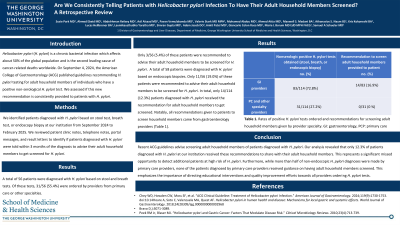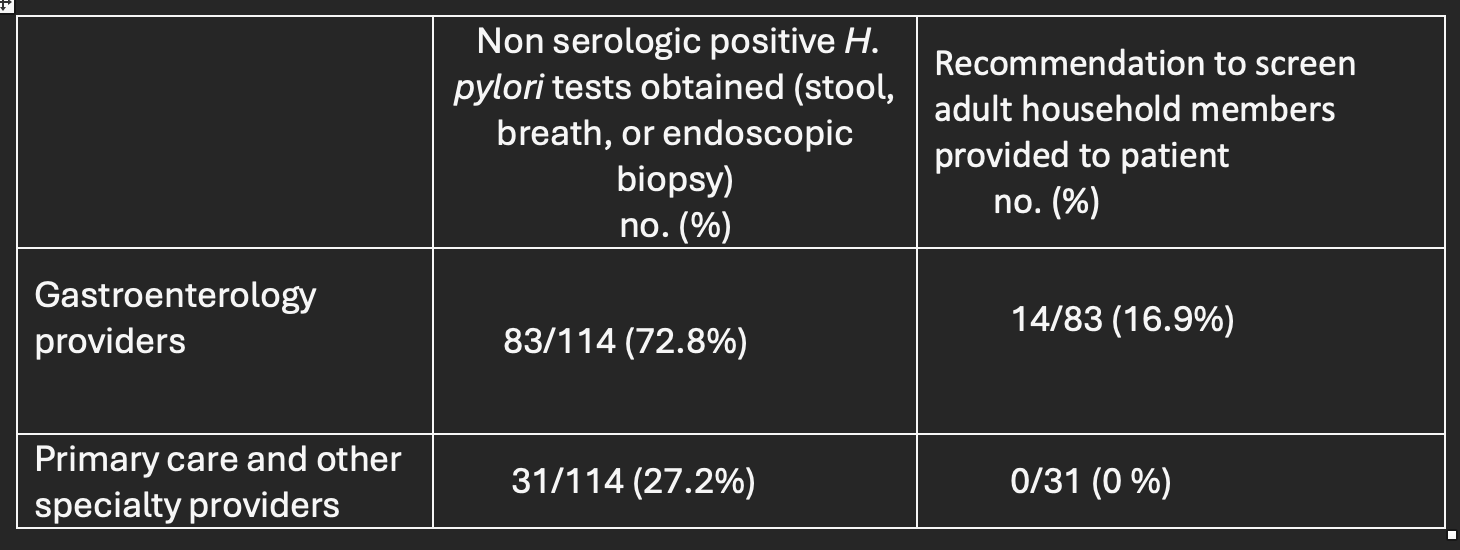Tuesday Poster Session
Category: Stomach and Spleen
P6329 - Are We Consistently Telling Patients with Helicobacter pylori Infection to Have Their Adult Household Members Screened? A Retrospective Review
Tuesday, October 28, 2025
10:30 AM - 4:00 PM PDT
Location: Exhibit Hall

Has Audio
- SP
Susie J. Park, MD
George Washington University School of Medicine and Health Sciences
Washington, DC
Presenting Author(s)
Susie J. Park, MD1, Ahmed Mohamed Ebeid, MD2, Abdelrhman Refaey, MD3, Asil Alsaad, MD4, Pavan Vemulakonda, MD1, Valerie S. Stark, MD, MPH5, Mohamed Abdou, MD4, Ahmed Attia, MD1, Maxwell Madani, BA1, Athanasios S. Naum, BS1, Kris Kokoneshi, BA1, Lucas Miecho. Heilbroner, BA1, Laxmikausthubha Yaratha, MD1, Simran Gupta, MD3, Adam Jacob, DO3, Ankit Patel, MD1, Giancarlo Colon Rosa, MD1, Marie L. Borum, MD, EdD, MPH, FACG3, Samuel A. Schueler, MD3
1George Washington University School of Medicine and Health Sciences, Washington, DC; 2Howard University Hospital, Washington, DC; 3Division of Gastroenterology and Liver Disease, Department of Medicine, George Washington University School of Medicine and Health Sciences, Washington, DC; 4Transplant Institute, Department of Surgery, George Washington University School of Medicine and Health Science, Washington, DC; 5Department of Medicine, George Washington University School of Medicine and Health Sciences, Washington, DC
Introduction: Helicobacter pylori (H. pylori) is a chronic bacterial infection which affects about 50% of the global population and is the second leading cause of cancer-related deaths worldwide. On September 4, 2024, the American College of Gastroenterology (ACG) published guidelines recommending H. pylori testing for adult household members of individuals who have a positive non-serological H. pylori test. We assessed if this new recommendation is consistently provided to patients with H. pylori.
Methods: We identified patients diagnosed with H. pylori based on stool test, breath test, or endoscopy biopsy at our institution from September 2024 to February 2025. We reviewed patient clinic notes, telephone notes, portal messages, and result letters to identify if patients diagnosed with H. pylori were told within 3 months of the diagnosis to advise their adult household members to get screened for H. pylori
Results: A total of 56 patients were diagnosed with H. pylori based on stool and breath tests. Of these tests, 31/56 (55.4%) were ordered by providers from primary care or other specialties. Only 3/56 (5.4%) of these patients were recommended to advise their adult household members to be screened for H. pylori. A total of 58 patients were diagnosed with H. pylori based on endoscopic biopsies. Only 11/56 (19.0%) of these patients were recommended to advise their adult household members to be screened for H. pylori. In total, only 14/114 (12.3%) patients diagnosed with H. pylori received the recommendation for adult household members to get screened. Notably, all recommendations given to patients to screen household members came from gastroenterology providers (Table 1)
Discussion: Recent ACG guidelines advise screening adult household members of patients diagnosed with H. pylori. Our analysis revealed that only 12.3% of patients diagnosed with H. pylori at our institution received these recommendations to share with their adult household members. This represents a significant missed opportunity to detect additional patients at high risk of H. pylori. Furthermore, while more than half of non-endoscopic H. pylori diagnoses were made by primary care providers, none of the patients diagnosed by primary care providers received guidance on having adult household members screened. This emphasizes the importance of directing educational interventions and quality improvement efforts towards all providers ordering H. pylori tests

Disclosures:
Susie J. Park, MD1, Ahmed Mohamed Ebeid, MD2, Abdelrhman Refaey, MD3, Asil Alsaad, MD4, Pavan Vemulakonda, MD1, Valerie S. Stark, MD, MPH5, Mohamed Abdou, MD4, Ahmed Attia, MD1, Maxwell Madani, BA1, Athanasios S. Naum, BS1, Kris Kokoneshi, BA1, Lucas Miecho. Heilbroner, BA1, Laxmikausthubha Yaratha, MD1, Simran Gupta, MD3, Adam Jacob, DO3, Ankit Patel, MD1, Giancarlo Colon Rosa, MD1, Marie L. Borum, MD, EdD, MPH, FACG3, Samuel A. Schueler, MD3. P6329 - Are We Consistently Telling Patients with <i>Helicobacter pylori</i> Infection to Have Their Adult Household Members Screened? A Retrospective Review, ACG 2025 Annual Scientific Meeting Abstracts. Phoenix, AZ: American College of Gastroenterology.
1George Washington University School of Medicine and Health Sciences, Washington, DC; 2Howard University Hospital, Washington, DC; 3Division of Gastroenterology and Liver Disease, Department of Medicine, George Washington University School of Medicine and Health Sciences, Washington, DC; 4Transplant Institute, Department of Surgery, George Washington University School of Medicine and Health Science, Washington, DC; 5Department of Medicine, George Washington University School of Medicine and Health Sciences, Washington, DC
Introduction: Helicobacter pylori (H. pylori) is a chronic bacterial infection which affects about 50% of the global population and is the second leading cause of cancer-related deaths worldwide. On September 4, 2024, the American College of Gastroenterology (ACG) published guidelines recommending H. pylori testing for adult household members of individuals who have a positive non-serological H. pylori test. We assessed if this new recommendation is consistently provided to patients with H. pylori.
Methods: We identified patients diagnosed with H. pylori based on stool test, breath test, or endoscopy biopsy at our institution from September 2024 to February 2025. We reviewed patient clinic notes, telephone notes, portal messages, and result letters to identify if patients diagnosed with H. pylori were told within 3 months of the diagnosis to advise their adult household members to get screened for H. pylori
Results: A total of 56 patients were diagnosed with H. pylori based on stool and breath tests. Of these tests, 31/56 (55.4%) were ordered by providers from primary care or other specialties. Only 3/56 (5.4%) of these patients were recommended to advise their adult household members to be screened for H. pylori. A total of 58 patients were diagnosed with H. pylori based on endoscopic biopsies. Only 11/56 (19.0%) of these patients were recommended to advise their adult household members to be screened for H. pylori. In total, only 14/114 (12.3%) patients diagnosed with H. pylori received the recommendation for adult household members to get screened. Notably, all recommendations given to patients to screen household members came from gastroenterology providers (Table 1)
Discussion: Recent ACG guidelines advise screening adult household members of patients diagnosed with H. pylori. Our analysis revealed that only 12.3% of patients diagnosed with H. pylori at our institution received these recommendations to share with their adult household members. This represents a significant missed opportunity to detect additional patients at high risk of H. pylori. Furthermore, while more than half of non-endoscopic H. pylori diagnoses were made by primary care providers, none of the patients diagnosed by primary care providers received guidance on having adult household members screened. This emphasizes the importance of directing educational interventions and quality improvement efforts towards all providers ordering H. pylori tests

Figure: : Rates of positive H. pylori tests ordered and recommendations for screening adult household members given by provider specialty
Disclosures:
Susie Park indicated no relevant financial relationships.
Ahmed Mohamed Ebeid indicated no relevant financial relationships.
Abdelrhman Refaey indicated no relevant financial relationships.
Asil Alsaad indicated no relevant financial relationships.
Pavan Vemulakonda indicated no relevant financial relationships.
Valerie Stark indicated no relevant financial relationships.
Mohamed Abdou indicated no relevant financial relationships.
Ahmed Attia indicated no relevant financial relationships.
Maxwell Madani indicated no relevant financial relationships.
Athanasios Naum indicated no relevant financial relationships.
Kris Kokoneshi indicated no relevant financial relationships.
Lucas Heilbroner indicated no relevant financial relationships.
Laxmikausthubha Yaratha indicated no relevant financial relationships.
Simran Gupta indicated no relevant financial relationships.
Adam Jacob indicated no relevant financial relationships.
Ankit Patel indicated no relevant financial relationships.
Giancarlo Colon Rosa indicated no relevant financial relationships.
Marie Borum indicated no relevant financial relationships.
Samuel Schueler indicated no relevant financial relationships.
Susie J. Park, MD1, Ahmed Mohamed Ebeid, MD2, Abdelrhman Refaey, MD3, Asil Alsaad, MD4, Pavan Vemulakonda, MD1, Valerie S. Stark, MD, MPH5, Mohamed Abdou, MD4, Ahmed Attia, MD1, Maxwell Madani, BA1, Athanasios S. Naum, BS1, Kris Kokoneshi, BA1, Lucas Miecho. Heilbroner, BA1, Laxmikausthubha Yaratha, MD1, Simran Gupta, MD3, Adam Jacob, DO3, Ankit Patel, MD1, Giancarlo Colon Rosa, MD1, Marie L. Borum, MD, EdD, MPH, FACG3, Samuel A. Schueler, MD3. P6329 - Are We Consistently Telling Patients with <i>Helicobacter pylori</i> Infection to Have Their Adult Household Members Screened? A Retrospective Review, ACG 2025 Annual Scientific Meeting Abstracts. Phoenix, AZ: American College of Gastroenterology.
